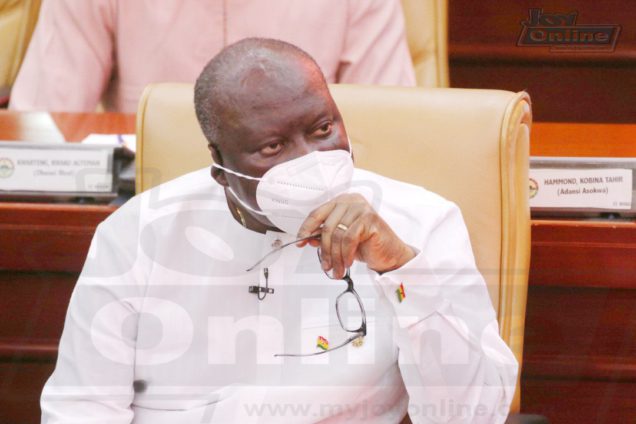Ghana’s public debt stock shot up by ¢2.7 billion to hit ¢344.5 billion in November 2021, the January 2022 Bank of Ghana Summary of Economic and Financial Data has revealed.
This pushed the debt to Gross Domestic Product (GDP) to 78.4% and further emphasised that the country’s debt has reached disturbing levels.
¢2.7 billion fresh loans, largely domestic debt, was added to the total debt in October 2021 and November 2021 respectively.
Even though government had indicated that it will borrow just about a billion cedis during the final quarter of 2021, the data from the Central Bank suggest otherwise.
According to the figures, the domestic debt went up to ¢179.4 billion in November 2021, from ¢178.1 billion recorded in September, 2021. This is equivalent to 40.8% of GDP.
The continuous borrowing by government on the domestic market is crowding out the private sector from access to funds, and consequently keeping lending rates relatively high.
The external debt remained unchanged at $27.9 billion in November 2021, from September, 2021. This is however equivalent to 37.6% of GDP.
But the cedi component of the external debt shot up because of the decline in the value of the cedi to dollar during the period.
On the other hand, the financial sector resolution bond stayed same at ¢14.9 billion in November 2021, equivalent to 3.4% of GDP.
Investors see value in Ghana’s beaten-down Bond
Meanwhile, Bloomberg says foreign investors still see value in Ghana’s bonds.
This is coming after the yield on the country’s international debt instruments shot up, few weeks ago. It has since retreated.
Analysts believe there will be a continuation in the performance of the bonds if the fiscal targets set by the government are being met.
“There will be a continuation in the performance of the bonds if we can see the fiscal targets set by the government are being met,” said Joe Delvaux, a money manager at Amundi in London. “Certainly the intentions are good and it’s one of the reasons why the bonds have been rallying, but it will come down to the question: can they deliver?”.
“There has been engagement from a variety of clients, which I think shows investor willingness to re-engage with the trade here,” said Calvyn Kirsten, a London-based emerging markets trader at JPMorgan Chase Bank. “The market has gone very quickly from pricing a severely distressed scenario. Once the finance ministry does what it says, then that should be taken off the table.”
Latest Stories
-
Maiden Women in Chemical Sciences conference opens with a call for empowerment
9 mins -
We’ll reclaim all Groupe Nduom stolen assets – Nduom declares
15 mins -
Center for Learning and Childhood Development Director Dr Kwame Sakyi honoured at Ghana Philanthropy Awards
9 hours -
Asantehene receives 28 looted artefacts
10 hours -
CAF WCL 2024: Ghana’s Thelma Baffour wins title with TP Mazembe
11 hours -
Benjamin Boakye slams politicisation of energy sector issues and ECG’s inefficiencies
11 hours -
Erastus Asare Donkor and Dr Neta Parsram win big at 10th Mining Industry Awards
11 hours -
Government is “suppressing information” about power sector challenges – IES Director
11 hours -
Majority of our debts caused by forex shortfall – ECG Boss
12 hours -
Pan-African Savings and Loans supports Ghana Blind Union with boreholes
12 hours -
Bole-Bamboi MP Yussif Sulemana donates to artisans and Bole SHS
13 hours -
Top up your credit to avoid potential disruption – ECG to Nuri meter customers
13 hours -
Dutch & Co wins 2024 Entrepreneur of the Year Award
13 hours -
We’ll cut down imports and boost consumption of local rice and other products – Mahama
15 hours -
Prof Opoku-Agyemang donates to Tamale orphanage to mark her birthday
16 hours

